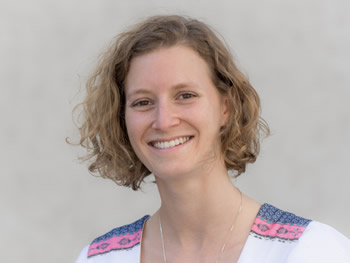By Jaira Vasconcellos
Posted: May 1, 2018

Madalena Madeira Reimão Pinto is a Ph.D. candidate in her 5th year at the Institute of Molecular Biotechnology (IMBA) of the Austrian Academy of Sciences and the University of Vienna, Austria, working under the supervision of Dr. Stefan Ameres. Her research aims to understand how post-transcriptional modifications impact RNA stability and function, and is focused on the non-templated addition of uridines to the 3¢-end of RNAs (known as U-tailing). U-tailing of several RNA species had been reported by several groups, however its regulatory functions remained largely unexplored. During her doctoral studies, Madalena has systematically characterized the distribution and impact of U-tailing on microRNAs using Drosophila melanogaster as an experimental model. Her work identified a novel quality control mechanism by which U-tailing suppresses the spill-over of intronic splicing-derived RNA-hairpins into the canonical microRNA pathway. Prior to starting her Ph.D., Madalena obtained a Bachelor’s degree in Cell and Molecular Biology from the New University of Lisbon, Portugal, and a Master’s degree in Human Molecular Genetics at the Imperial College London.
“Observe what nature tells you, write all the details down, and think hard about what it could mean.”
“My childhood hero is David Attenborough,” she said. “I still watch every single wild-life documentary, and it always blows me away how awesome nature is. These documentaries make me appreciate how much methodological observation of biological phenomena can teach us: find a biological question that intrigues you, design a good methodological strategy to unambiguously address it, observe what nature tells you, write all the details down, and think hard about what it could mean. Then, re-iterate.” But, she added, “Science is full of ups and downs. One must learn how to appreciate both success and failure as an opportunity to learn and find joy in all the small steps that make up the process of discovery, rather than the accomplishment of the discovery itself.”
Madalena was one of the first students to join the Ameres laboratory, which opened its doors in 2012. She is happy about having joined a relatively new laboratory for pursuing her Ph.D. and notes many benefits, like learning techniques directly from her supervisor and having more one-on-one discussions. One unforeseen aspect she mentions is that “the overall success of the laboratory heavily relies on each member’s individual success, which comes with a higher pressure for projects to work out.” Nevertheless, in Madalena’s opinion, communication is key: “frequently updating each other [you and your mentor] on expectations is a good way to prevent either of the parties from being disappointed.” Another important and practical piece of advice she received was to always analyze her data and prepare publication quality figures as soon as she finished an experiment. That way, she said, “You gain a lot of clarity on your project’s outline and all the figures are ready in advance for when you need to prepare a manuscript or a talk.”
Her advice for current and future graduate students is to strive to get the most out of pursuing a Ph.D. She believes that, “You will gain a very useful set of skills that will be relevant regardless of continuing in academia or choosing to pursue another career path.” Madalena, for example, co-organized her institute’s Ph.D. symposium, which gave her a lot of perspective on what it takes to set up a scientific event. She said, “New challenges can show you that you are capable of more than what you give yourself credit for”. She also finds inspiration from the people around her who are excited about their science and have a positive outlook on daily life. “They are an important driving force for me to strive,” she said. She thinks it is an exciting time to study RNA, and, as a member of the RNA Society, she enjoys being part of a community of individuals who are “to some extent addicted to RNA, and that make you feel normal about being one too!”
Madalena’s favorite RNA is Flamenco, a non-coding RNA that is essential for fertility in fruit flies (of note, Flamenco is an atypical transcript, it emanates from a single promoter and is around 400 Kb long!). You can follow and connect with Madalena on Twitter @madalenamrp.
Photo credit: Peter Duchek
